Tag Archive for: education

Vanderbilt’s Dr. Carol Swain on U.S. History, Race, & 1776 Unites
Dr. Carol Swain, a political scientist, discusses her background, experiences with discrimination, faith's role in justice, and her work with 1776 Unites and public intellectuals on The Learning Curve podcast.
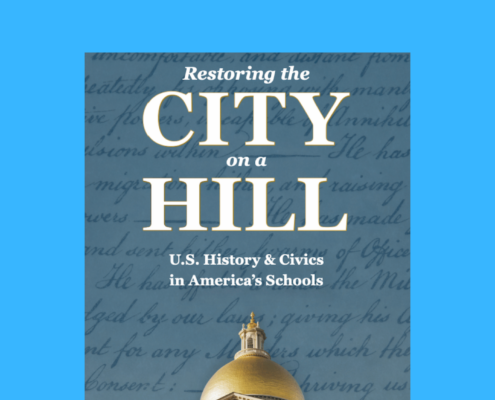
New Book Calls on States to Improve U.S. History and Civics Education
Pioneer Institute is today releasing Restoring the City on a Hill: U.S. History and Civics in America's Schools, which details the decline of history and civics knowledge among students and offers a plan for how states and local school districts can foster understanding of and curiosity about our nation's history.

Massachusetts Residents Score a ‘D’ in Poll Based on U.S. Citizenship Test
When asked a series of questions about how the federal government works that are based on the U.S. citizenship test, Massachusetts residents answered on average 63 percent of them correctly, earning a collective grade of “D” in a poll commissioned by Pioneer Institute and conducted by Emerson College Polling. The result is just over the 60 percent score required to pass the actual citizenship test.

Dr. Ramachandra Guha on Gandhi’s Enduring Legacy
This week on The Learning Curve, guest co-hosts Charlie Chieppo and Mariam Memarsadeghi interview writer and biographer Dr. Ramachandra Guha. The author of the definitive two-volume biography of Mohandas K. Gandhi, Guha discusses Gandhi’s formative educational experiences, spirituality, political leadership, and philosophy of nonviolent resistance.

Pioneer Study: Adopt Innovative Approaches to Address K-12 STEM Teacher Shortage
States and school districts should look to innovations like endowing science, technology, engineering, and math (STEM) chairs in high schools to address a growing K-12 teacher shortage, according to a new white paper published by Pioneer Institute.

Paul Vallas on Chicago, School Reform, and Teachers’ Unions
This week on The Learning Curve, guest co-hosts Charlie Chieppo and Mary Tamer, executive director of Democrats for Education Reform, Massachusetts, speak with Paul Vallas, former CEO of the Chicago Public Schools and a candidate for mayor of that city earlier this year.

U-Ark. Prof. Albert Cheng on Classical Education & School Choice
This week on The Learning Curve, guest co-hosts Charlie Chieppo and Alisha Searcy speak with Albert Cheng, an Assistant Professor at the Department of Education Reform in the College of Education and Health Professions at the University of Arkansas. Professor Cheng talks about the importance of classical education for guiding educational philosophy and practice and shaping the character of students.
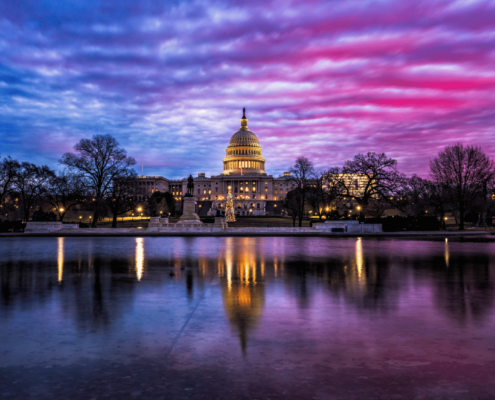
History Class: A New Culture War Front
Progressives and conservatives have sponsored politically influenced alterations to history curricula across the country. Recovering trust in history education is an imperative, and teachers and educators can help by making students aware that the facts of history are themselves political, constantly manipulated to advance parties’ and politicians’ own interests. Curricular standards that offer this guidance would weaken biased assaults from either ideological side.

Professor Jay Parini on Thirteen Books That Changed America
This week on The Learning Curve, Jay Parini, Professor of English and Creative Writing at Middlebury College, discusses his book Promised Land: Thirteen Books That Changed America, detailing how William Bradford’s Of Plymouth Plantation, The Federalist Papers, and the works of Thoreau, Stowe, Twain, Du Bois, and others have shaped the American mind, character, and identity.

Colossal Academy’s Shiren Rattigan on Microschools and School Choice
This week on The Learning Curve, guest co-hosts Charlie Chieppo and Kendra Espinoza interview Shiren Rattigan of Colossal Academy, a microschool in Florida. They discuss how Shiren became interested in K-12 education and how and why the COVID-19 pandemic led to her founding a microschool.

U.K. Cambridge’s Prof. David Abulafia on Oceans, Seas, & Global Trade
This week on The Learning Curve, Professor David Abulafia from Cambridge University discusses the many roles of the world’s oceans in human history and trade. He focuses on how the Pacific, Indian, and Atlantic oceans, along with the Mediterranean Sea, have spurred the rise of civilizations. He concludes with a reading from his book The Boundless Sea: A Human History of the Oceans.
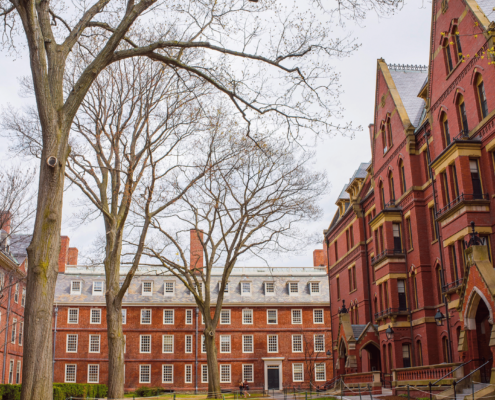
The Rise of the Grievance Essay?
In the wake of the Supreme Court’s decision that racial discrimination in college admissions is unconstitutional, Harvard and other elite colleges and universities have adopted new essay prompts that openly invite applicants to air identity-based grievances in hopes of aiding their admissions chances.
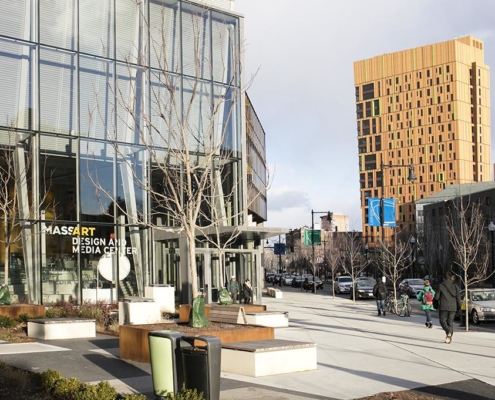
University Presidents Salary Comparison, Pt. 2
See how Massachusetts state schools' presidential salaries match up. Presidents with schools who have less than a 1,000 student enrollment are near the top of the list.

Pulitzer Winner Tamara Payne on the Life and Legacy of Malcolm X
This week on The Learning Curve, guest cohosts Alisha Searcy and Mariam Memarsadeghi interview Tamara Payne, award-winning biographer, about Malcolm X. They delve into his early life, rise in the Nation of Islam, civil rights movement involvement, pilgrimage, assassination, and ongoing legacy debate. Ms. Payne concludes with a reading from her book.

Johns Hopkins’ Dr. David Steiner on Teaching Wisdom in Schools
This week on The Learning Curve, guest cohosts Charlie Chieppo and Alisha Searcy join Dr. David Steiner for a wide-ranging discussion about the importance of education as a means of transmitting enduring wisdom to young people.

Boston’s Budget: Wu and City Council Debate
Learn more about the details of the latest Boston operating budget proposal. Mayor Wu and City Council debate on specifics of the bill, such as cuts to different services vital to the city.

Pioneer Study: Every Student Succeeds Act Not Meeting Needs of All Students
The most recent reauthorization of the Elementary and Secondary Education Act makes some progress toward fulfilling the mandate that public school districts provide wide-ranging academic and educational supports to students who attend nonpublic schools, but there is more to be done.
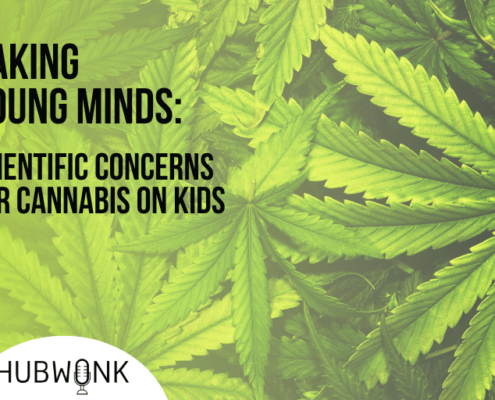
Baking Young Minds: Scientific Concerns for Cannabis on Kids
Joe Selvaggi talks with professor of psychiatry Dr. Ryan Sultan about the findings of his recently released study on the effects of cannabis on the mental health of American adolescents. Dr. Sultan’s work shows a substantial correlation between cannabis use and negative mental health outcomes.

Charter School Success: Importance in Suffolk County and College Enrollment
Learn about how charter schools set students up for success, especially in urban areas like Suffolk county. MCAS scores and college enrollment are stats that point to the impact of Charter schools.
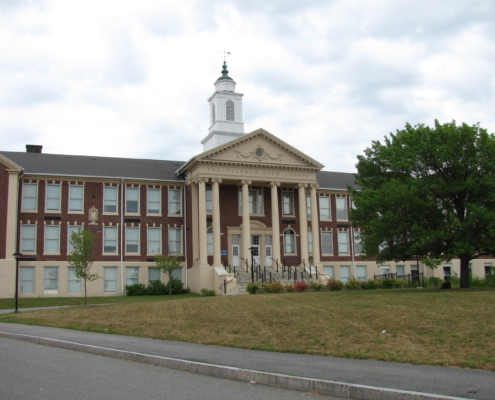
A Bird’s Eye View: Massachusetts K-12 Education by County
Massachusetts has had the best public school system in the country for the past two decades: along with some of the highest per pupil spending as well. Among the counties, does high per pupil spending translate to better results? The short answer: not really.

Becket Fund’s Eric Rassbach on Religious Liberty & American Schooling
Eric Rassbach of the Becket Fund for Religious Liberty discusses school choice and religious freedom, competing legal philosophies and views of the U.S. Constitution, and why issues pertaining to religion and schools remain so divisive at the K-12 level.

PRI’s Lance Izumi on Charter Schools & School Choice
Lance Izumi of the Pacific Research Institute discusses K-12 education reform, declining test scores, COVID-related learning loss, and the growth of education bureaucracy. He reflects on charter schools, school choice, and how U.S. history and civics should be taught.

State, Regional, and National Employment Trends Point to an Aging Workforce: Part Two
This blog furthers the discussion about the aging workforce by examining how decreased employment among young people as they turn to education instead impacts the issue. Then, it explains the implications of an older workforce on the future of labor and productivity in the U.S.

Study: Immigrant Entrepreneurs Benefit N.E. Economy, Despite Facing Obstacles to Growth
BOSTON – Immigrants in Massachusetts and New England are more likely to be self-employed, but the businesses they own tend to be in different industries than those owned by the U.S. born, according to a new study published by Pioneer Institute.

McGill Prof. Marc Raboy on Guglielmo Marconi & Global Communications
This week on The Learning Curve, McGill University Professor Marc Raboy, author of Marconi: The Man Who Networked the World, explores how twentieth-century Italian communications pioneer Guglielmo Marconi made his world-changing discoveries.

Donald Graham on The Washington Post, Media, and Educating Immigrants
This week on The Learning Curve, Donald Graham, Chairman of Graham Holdings Company, discusses the history of The Washington Post, his views on changing media in America, and his work in higher education reform and philanthropy on behalf of immigrant youth.

Columbia Law’s Philip Hamburger on Church, State, & School Choice
This week on The Learning Curve, noted constitutional law professor Philip Hamburger of Columbia Law School discusses the legal basis for private and religious school choice, and how American constitutionalism supports parental choice in education.

AEI’s Dr. Diana Schaub on the Founders, Lincoln, Frederick Douglass, & Civics
This week on The Learning Curve, Loyola University Maryland professor and AEI senior fellow Dr. Diana Schaub explores the legacies, speeches, and writings of Abraham Lincoln and Frederick Douglass, and how knowledge of U.S. history and primary sources can debunk revisionist approaches to teaching history and civics.

Morehouse’s Prof. Marisela Martinez-Cola on Pre-Brown Cases for Educational Equality
This week on The Learning Curve, Morehouse College's Dr. Marisela Martinez-Cola, JD, discusses her book The Bricks before Brown: The Chinese American, Native American, and Mexican Americans' Struggle for Educational Equality, and the long struggle for equal opportunity in American education.

Marquette’s Dr. Howard Fuller on School Choice, Charter Schools, and Race
This week on The Learning Curve, Dr. Howard Fuller, Founder/Director of the Institute for the Transformation of Learning (ITL) at Marquette University, discusses education reform, school choice, charter public schools, race, and the ongoing struggle to provide educational opportunity to all children in America.
